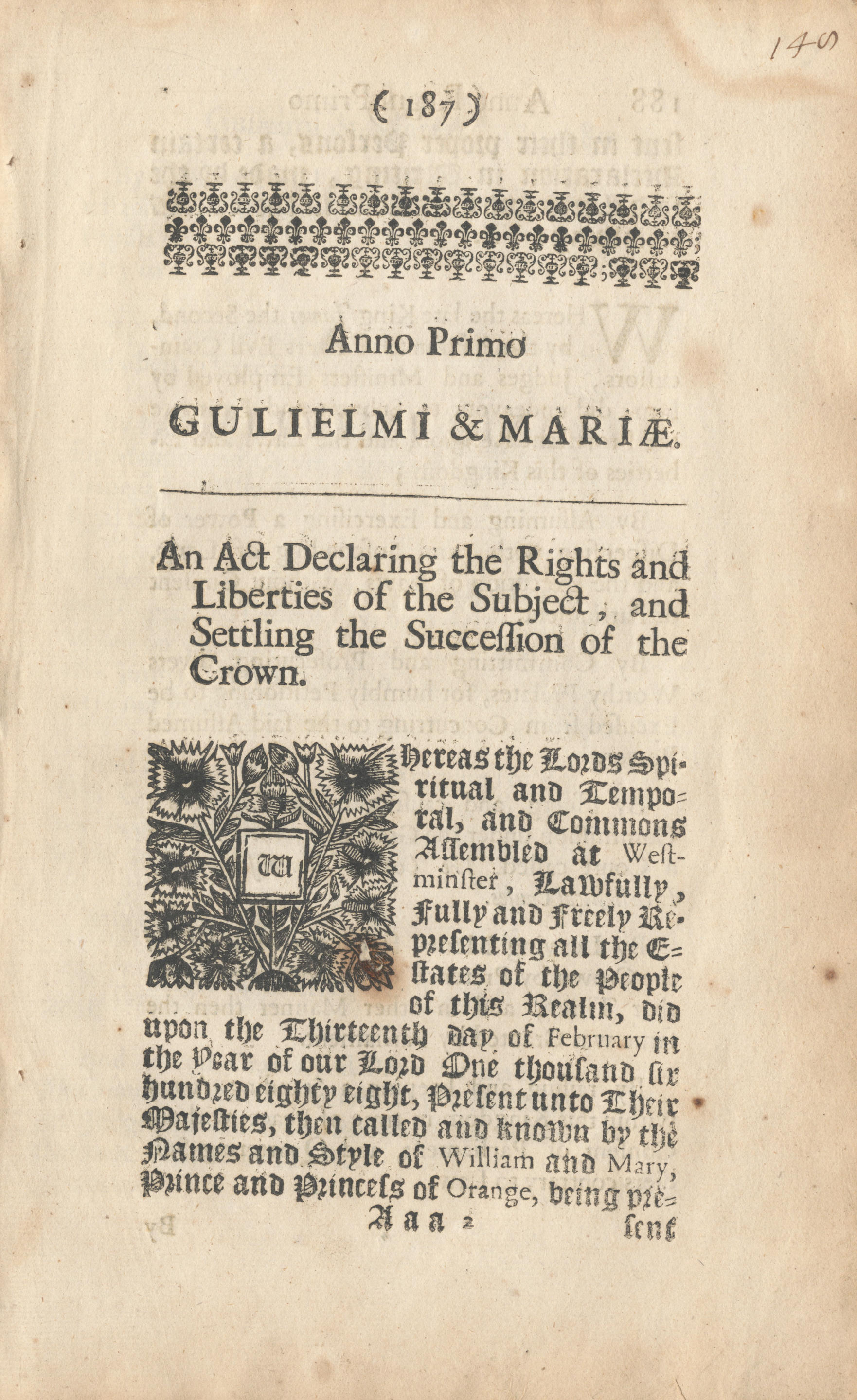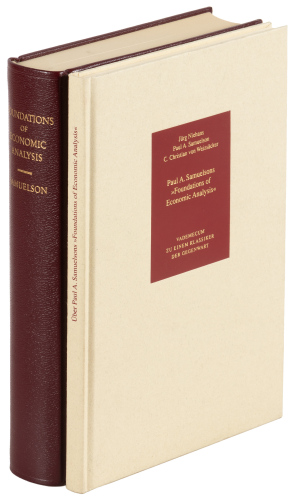TURING, ALAN MATHISON. 1912-1954. "On Computable Numbers, with an Application to the Entscheidungsproblem," appearing in: Proceedings of the London Mathematical Society, series 2, vol 42, pts 3-4, pp 230-265, London: C.F. Hodgson & Son, Ltd, November 30, 1936-December 23, 1936. 4to. Complete volume issue, original green cloth, gilt.
WITH: "On Computable Numbers... A Correction," appearing in Proceedings of the London Mathematical Society, Series 2, volume 43, pt 7, December 30, 1937, pp 544-546. Journal issue, original wrappers.
WITH: "Systems of logic based on ordinals" in Proceedings of the London Mathematical Society, Series 2, volume 45, pt 3, March 21, 1939, pp 161-228. Journal issue, original wrappers.
FIRST EDITION OF THE MOST IMPORTANT 20TH CENTURY PAPER IN COMPUTER SCIENCE, THE GROUND-BREAKING ACHIEVEMENT THAT LED TO TURING'S DEVELOPMENT OF A UNIVERSAL COMPUTING MACHINE. Turing's paper not only answered the famous Entscheidungsproblem posed by David Hilbert in 1928, but also showed that a universal machine was in fact a possibility, paving the way for the development of the modern computer.
In 1928, the German mathematician David Hilbert (1862-1943), in his address to the International Congress of Mathematicians in Bologna posed his Entscheidungsproblem, on whether mathematics are decidable, basically "a problem concerning a formal system based on applying the rules of first-order logic ... to a system of axioms for the natural numbers" (Davis p 101). Kurt Gödel (1906-1978) famously answered this question two years later in his "Über formal unentscheidbare Sätze der Principia Mathematica und verwandter Systeme I," which introduced his revolutionary Incompleteness Theorem, showing "that even powerful logical systems could not hope to encompass the full scope of mathematical truth" (Davis p 118). While Gödel introduced the theorem showing that there was no algorithm that could answer the Entscheidungsproblem, Turing actually proved it. In order to answer the Entscheidungsproblem, Turing first created an imaginary computer device, and then came up with the concept of "computable numbers," i.e., numbers that are defined by some definite rule and therefore calculable on a universal machine. Turing demonstrated that these numbers could calculate every number that could arise in mathematical computations. He then showed that the computable numbers could give rise to uncomputable numbers which could not be calculated using a definite rule, proving that there could be no mechanical process that could be used to solve all mathematical questions.
Exceeding rare, and here with his "corrections" published the following year in response to questions raised by Swiss mathematician Paul Bernays, as well as his 1939 PhD thesis "Systems of Logic based on Ordinals" which tackled Gödel's incompleteness theorems, and introduced his "oracle" or o-machine and the idea of relative computability, another groundbreaking contribution to the field of mathematics and computer science. Davis, Martin, The Universal Computer. The Road from Leibniz to Turing, NY: Norton, [2000]; Origins of Cyberspace 394.
TURING, ALAN MATHISON. 1912-1954. "On Computable Numbers, with an Application to the Entscheidungsproblem," appearing in: Proceedings of the London Mathematical Society, series 2, vol 42, pts 3-4, pp 230-265, London: C.F. Hodgson & Son, Ltd, November 30, 1936-December 23, 1936. 4to. Complete volume issue, original green cloth, gilt.
WITH: "On Computable Numbers... A Correction," appearing in Proceedings of the London Mathematical Society, Series 2, volume 43, pt 7, December 30, 1937, pp 544-546. Journal issue, original wrappers.
WITH: "Systems of logic based on ordinals" in Proceedings of the London Mathematical Society, Series 2, volume 45, pt 3, March 21, 1939, pp 161-228. Journal issue, original wrappers.
FIRST EDITION OF THE MOST IMPORTANT 20TH CENTURY PAPER IN COMPUTER SCIENCE, THE GROUND-BREAKING ACHIEVEMENT THAT LED TO TURING'S DEVELOPMENT OF A UNIVERSAL COMPUTING MACHINE. Turing's paper not only answered the famous Entscheidungsproblem posed by David Hilbert in 1928, but also showed that a universal machine was in fact a possibility, paving the way for the development of the modern computer.
In 1928, the German mathematician David Hilbert (1862-1943), in his address to the International Congress of Mathematicians in Bologna posed his Entscheidungsproblem, on whether mathematics are decidable, basically "a problem concerning a formal system based on applying the rules of first-order logic ... to a system of axioms for the natural numbers" (Davis p 101). Kurt Gödel (1906-1978) famously answered this question two years later in his "Über formal unentscheidbare Sätze der Principia Mathematica und verwandter Systeme I," which introduced his revolutionary Incompleteness Theorem, showing "that even powerful logical systems could not hope to encompass the full scope of mathematical truth" (Davis p 118). While Gödel introduced the theorem showing that there was no algorithm that could answer the Entscheidungsproblem, Turing actually proved it. In order to answer the Entscheidungsproblem, Turing first created an imaginary computer device, and then came up with the concept of "computable numbers," i.e., numbers that are defined by some definite rule and therefore calculable on a universal machine. Turing demonstrated that these numbers could calculate every number that could arise in mathematical computations. He then showed that the computable numbers could give rise to uncomputable numbers which could not be calculated using a definite rule, proving that there could be no mechanical process that could be used to solve all mathematical questions.
Exceeding rare, and here with his "corrections" published the following year in response to questions raised by Swiss mathematician Paul Bernays, as well as his 1939 PhD thesis "Systems of Logic based on Ordinals" which tackled Gödel's incompleteness theorems, and introduced his "oracle" or o-machine and the idea of relative computability, another groundbreaking contribution to the field of mathematics and computer science. Davis, Martin, The Universal Computer. The Road from Leibniz to Turing, NY: Norton, [2000]; Origins of Cyberspace 394.



.jpg?w=400)



.jpg?w=400)

.jpg)





Testen Sie LotSearch und seine Premium-Features 7 Tage - ohne Kosten!
Lassen Sie sich automatisch über neue Objekte in kommenden Auktionen benachrichtigen.
Suchauftrag anlegen